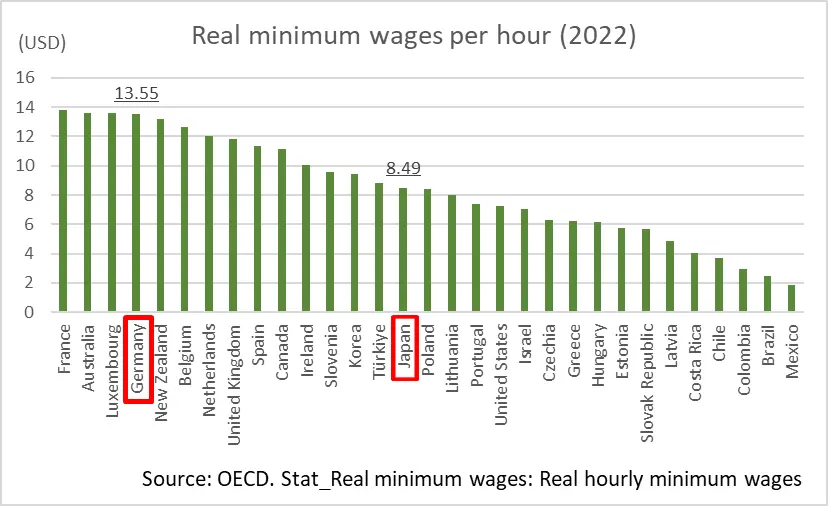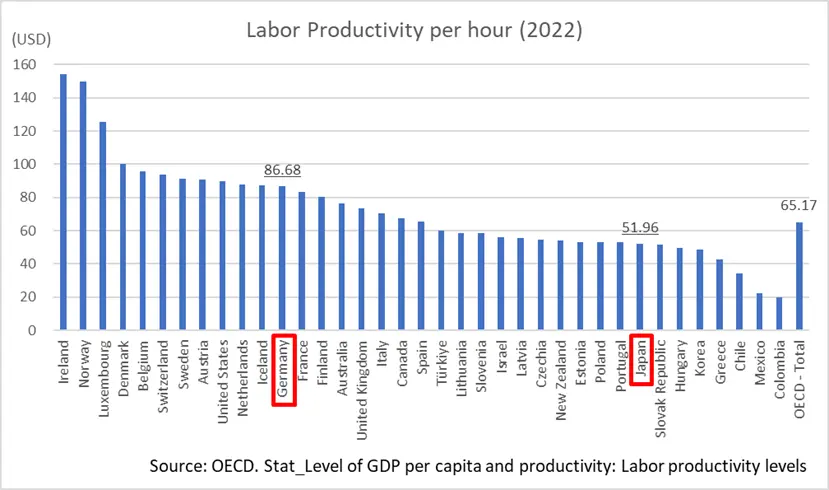Labor Policy: Do an Orchestra and a Beer Boost Productivity?

Germany has a higher GDP than Japan, despite having only two-thirds of Japan's population. In 2023, Japan's nominal GDP is predicted to drop below Germany's, causing Japan to fall from third to fourth place in the world. The IMF's World Economic Outlook, released in October 2023, forecasts Japan's nominal GDP to be US$4,230.8 billion, a 0.2% decrease from the previous year. Meanwhile, Germany's nominal GDP is expected to increase by 8.4% to US$4,429.8 billion (IMF, World Economic Outlook Database, October 2023). This suggests a significant difference in labor productivity. Let's explore the labor policies in both countries, along with cultural influences, to assess if this has an impact on the national GDP change that is expected.
Navigating the Labor Landscape: Contrasting Policies and Union Challenges
Japan has a ceiling on overtime hours, but it has not been enforceable through penalties. In contrast, Germany has a ceiling on working hours, and their regulations include stricter penalties than those in Japan. Additionally, special provisions have allowed overtime work without a cap in Japan. A 2019 amendment in Japan established a maximum overtime limit with penalties in law. It also sets an upper limit that cannot be exceeded even under extraordinary circumstances. The law will be fully applied from April 2024 to industries that were previously partially exempt. This has led to concerns about the '2024 problem' of being unable to secure the necessary labor force for construction projects, automobile driving operations, and medical services. Japanese society has been dependent on long working hours for its existence, and this has been identified as a major problem.
Moreover, there are differences in labor unions to protect workers' rights and ensure equitable working conditions. In Japan, labor unions are organized by company, while in Germany, they are industry-based. As part of the Japanese-style employment system, enterprise-based unions have traditionally been believed to enhance corporate productivity. However, labor unions encounter challenges such as decreasing rates of organization, participation, and organizational strength (Fujimura 2012). Joining a union may not seem beneficial to Japanese workers. In Japan, workers have the right to strike, except for public employees, but actual labor disputes are infrequent. This is due, in part, to the fact that even if a strike occurs at one company, consumers have other options, making it difficult for workers to achieve their demands. In contrast, the German model has powerful unions and a relatively robust collective bargaining system(Jäger, Noy, and Schoefer 2022). For instance, the minimum wage campaign led by German trade unions effectively resulted in the establishment of a legal minimum wage in Germany in 2015(Nowak 2015).
In Germany, labor contracts commonly specify job descriptions and working conditions at the time of hiring(Kirchner, Kremp, and Magotsch, 2018). On the other hand, in Japan, these details are often not included in the contract. In some cases, duties, work location, and working hours are even left undetermined(Tsuru 2017). Furthermore, it is uncommon in Japan for employees to negotiate with their employers regarding working conditions. As a result, workers' wages are sometimes undervalued. According to OECD statistics, Japan's real minimum wage per hour is $8.49, almost 40% lower than Germany's $13.55 (OECD. Stat, October 2023).
To increase labor productivity, wages should be increased or working hours should be reduced. Nevertheless, in Japan, labor productivity remains low due to both low wages and long working hours.
Labor Productivity = Value of Goods or Services (Output) / Amount of Labor Used (Input)


Cultural Harmonies: Exploring the Balance of Work and Social Traditions
When comparing the number of professional orchestras in Japan and Germany, Japan has 34 while Germany has 129, approximately four times more. I went to hear orchestras in four cities in Germany and was surprised to see so many people in casual clothes and with families, which is unthinkable in Japan. These are examples of how closely live music is connected to people in Germany. Perhaps enjoying music with family and friends after work or on holidays can contribute to higher productivity. Alternatively, high productivity may allow people to afford to enjoy music in their leisure time.
As for drinking culture, Japanese Sake and German Beer can be compared. While beer is typically ordered by the glass or bottle per person, sake is often shared among a group who pour it into each other's cups. This can potentially be seen as a reflection of German individualism and Japanese collectivism.
In Japan, it is common for people to go out to eat with their bosses or colleagues after work and discuss work over drinks. These gatherings, also known as 'Nominication,' are crucial for building workplace relationships, despite being considered outside of work hours(Yamauchi and Orr 2011). However, after-work drinking parties may last until late at night where important information is exchanged and decision-making may take place. Therefore, not participating in drinking sessions can harm work and is often considered a work-related activity(Ben-Ari 2003). Employees are constantly under pressure not only to deliver results at work but also to maintain positive relationships with colleagues, leading to increased stress and potential mental health issues. These pressures, coupled with tendencies to overwork, contribute to a heightened risk of stress and other mental health challenges(Pilla and Kuriansky 2018). It can be said that, falling into a negative spiral where productivity fails to improve further is inevitable because one cannot perform well when in an unhealthy state.
Tailoring Policies: Adapting to Societal Essence for Effective Change
Japan also has many positive aspects. For instance, packages can be re-delivered at convenient times, shopping can be done on Sundays, and even in non-upscale restaurants, customers can expect a courteous service without tipping. It could be argued that these added values are not reflected in the GDP. However, based on my experience working in Japan, I believe that the German approach of balancing work and personal life with a certain degree of separation is more sustainable. This harmonized way of living could impact various facets, potentially affecting not just individual contentment but also playing a role in broader economic well-being, including GDP growth.
It is crucial to have an environment that enables individuals to choose their preferred way of working. As mentioned above, cultural factors heavily influence the working environment, and it is not as easy as adopting policies from other countries. Policies must be tailored to fit the history, culture, and national character of each country.
References:
- IMF World Economic Outlook Database, (October 2023), Gross domestic product per capita, current price https://www.imf.org/en/Publications/WEO/Issues/2023/10/10/world-economic-outlook-october-2023
- Hiroyuki Fujimura, (2012), Japan’s Labor Unions: Past, Present, Future Japan Labor Review Vol. 9
- Simon Jäger, Shakked Noy, and Benjamin Schoefer, (2022), The German Model of Industrial Relations: Balancing Flexibility and Collective Action NBER Working Paper No. w30377
- Jörg Nowak, (2015), Union Campaigns in Germany Directed against Inequality: The Minimum Wage Campaign and the Emmely Campaign, Journal of Economic Perspectives Vol. 36, No.4
- Jens Kirchner, Pascal R Kremp, and Michael Magotsch, (2018), Key Aspects of German Employment and Labour Law. Springer, Berlin.
- Kotaru Tsuru, (2017) Reforming the Regular Employment System: Toward a New Norm of Job-Specific Employment Contracts, Social Science Japan Journal, Social Science Japan Journal, Vol. 20, No. 1
- OECD. Stat, (October 2023) Real minimum wages. https://stats.oecd.org/Index.aspx?DataSetCode=RMW
- OECD. Stat, (December 2022) Growth in GDP per capita, productivity and ULC. https://stats.oecd.org/Index.aspx?DataSetCode=PDB_GR#
- Kazuaki Yamauchi and Thomas Orr, (2011), Nominication for Strategic Leadership: Best Practices in Japanese-Style Communication for Managerial Purposes, 2011 IEEE International Professional Communication Conference, Cincinnati, OH, USA,
- Eyal Ben-Ari, (2003) Sake and “Space Time”: Culture, Organization and Drinking in Japanese Firms, Senri Ethnological Studies Vol. 64
- David Pilla and Judith Kuriansky, (2018), Mental Health in Japan: Intersecting Risks in the Workplace, Journal of Student Research Vol. 7, No. 2
About the Author

Nagi Tanimoto is an MPP student at the Willy Brandt School of Public Policy. She has over a decade of experience at the Ministry of Finance in the Japanese government and holds a Bachelor of Laws degree
~ The views represented in this blog post do not necessarily represent those of the Brandt School. ~